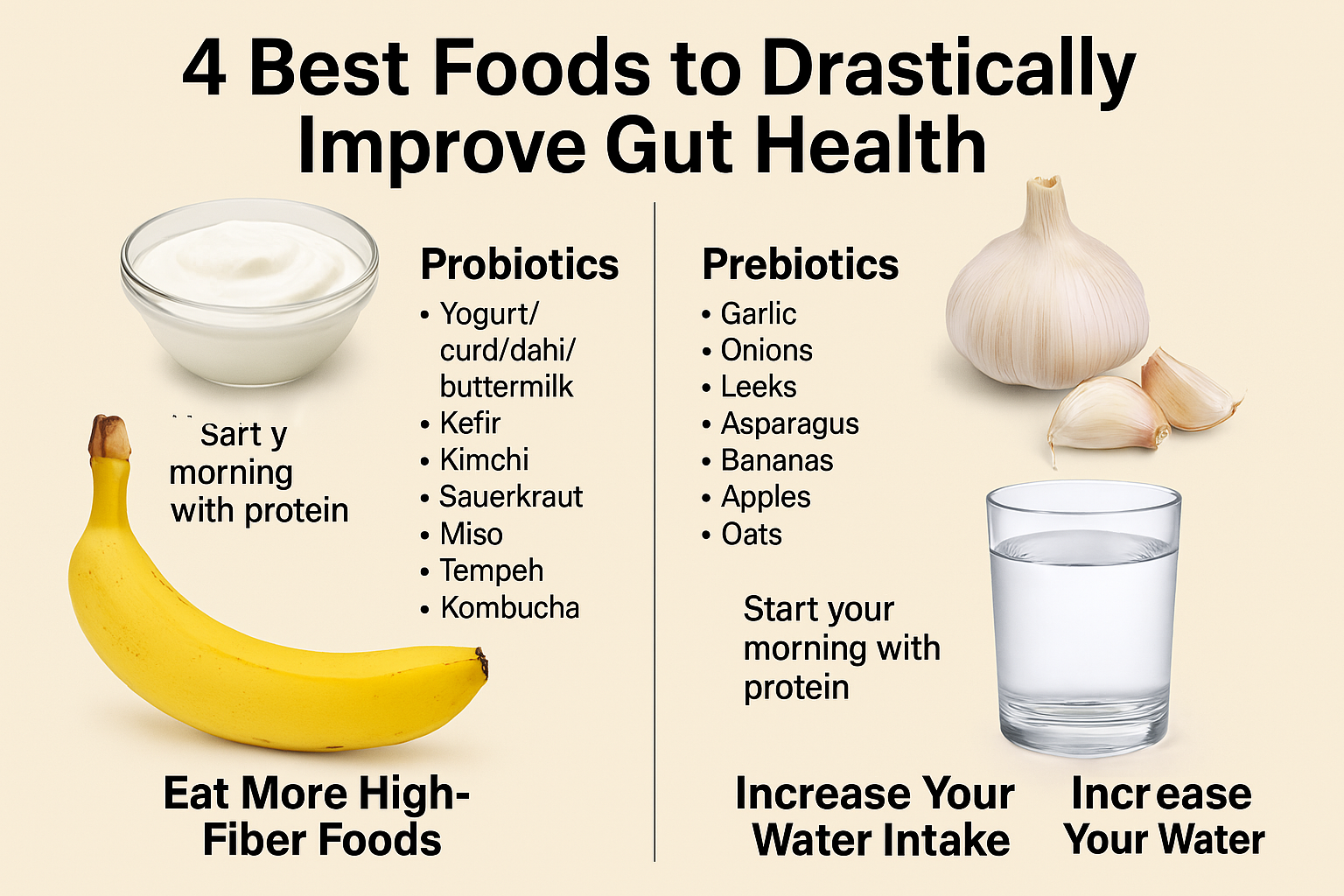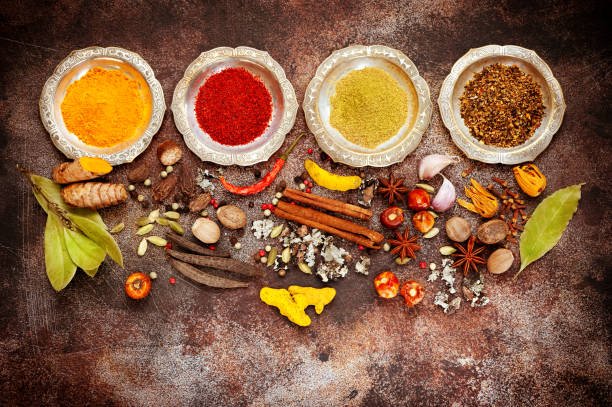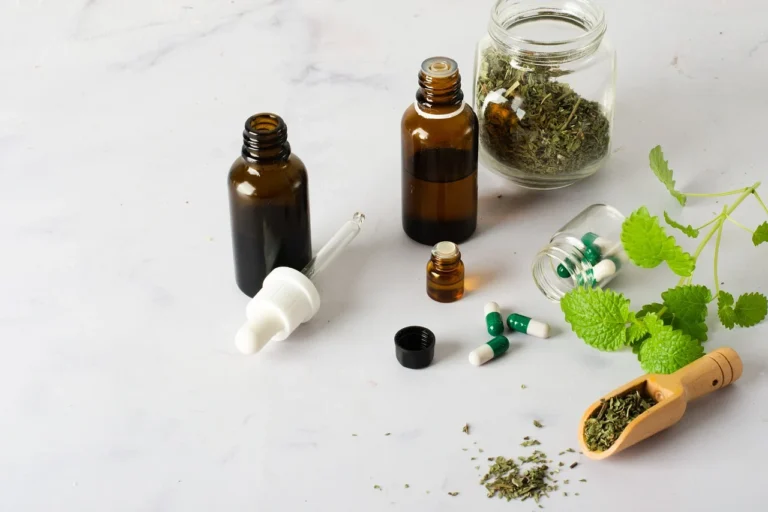4 Best Foods That Drastically Improve Gut Health
Table of Contents
ToggleWhat's in Gut Healing Superfoods in India ?
Discover 4 gut healing superfoods in India that support digestion, reduce bloating, and improve skin. Backed by Ayurveda and easy to use daily.If you’re struggling with bloating, gas, fatigue, or acne flare-ups, your gut might be crying for help. And no — you don’t need expensive detox kits or imported supplements.
The truth is, there are powerful gut healing superfoods in India that can completely transform your health if used correctly.These gut healing superfoods in India are not just home remedies — they’re ancient Ayurvedic allies and modern gut saviors.
Whether you’re managing IBS, skin issues, irregular periods, or mental fog, using gut healing superfoods in India daily can support your digestion, reset your microbiome, and nourish your gut lining.
I’ve personally relied on these gut healing superfoods in India over the past year. From isabgol to garlic, from chaas to ajwain water — these ingredients are not only affordable and easy to find, but they’re also incredibly effective.
What makes these gut healing superfoods in India stand out is their ability to work gently, without side effects, while aligning with your body’s natural rhythm.If you’re tired of trying products that promise everything and deliver nothing, this is your sign to switch to gut healing superfoods in India that have been trusted for generations.
The results aren’t overnight — but they’re real, sustainable, and backed by both science and ancient wisdom.
4 Gut Healing Superfood In India
1. Psyllium Husk – A Classic Gut Healing Superfood in India
One of the most underrated gut healing superfoods in India, Isabgol is a traditional remedy for constipation — but its benefits go way beyond bowel movements.
Why It Heals the Gut:
Rich in soluble fiber that forms a gel in the stomach
Soothes the intestinal lining (especially helpful in IBS)
Feeds beneficial gut bacteria (prebiotic effect)
Reduces acidity and gas
Best Way to Take:
1 tsp of Isabgol in warm water at night
Or mix with curd in the afternoon (if dairy suits you)If you’re sensitive, start with ½ tsp and increase gradually.
2. Fermented Garlic (Raw or Pickled)
Ayurveda calls garlic a natural digestive tonic — but when fermented or taken raw, it becomes a gut-friendly probiotic powerhouse.
Why It Heals the Gut:
Natural antibacterial + antifungal (helps rebalance gut flora)
Stimulates digestive fire (Agni) and bile flow
Boosts immunity by strengthening gut wall
Best Way to Take:
1 raw garlic clove crushed + left for 5 mins → Swallow with warm water
Or eat fermented garlic pickle with lunch
Bonus: Also supports liver detox and hormone balance.
3. Buttermilk – Most Cooling Gut Healing Superfood in India
If you can tolerate dairy, chaas (buttermilk) is a soothing gut healing superfood in India. It’s cooling, probiotic-rich, and Ayurvedically approved.
Why It Heals the Gut:
Loaded with lactic acid bacteria for digestion
Calms down gut inflammation and acidity
Promotes regular bowel movement and hydration
How to Make It:
1 tbsp curd + 1.5 cups water + pinch of rock salt, jeera, and hing
Blend and sip post-lunch
Avoid cold chaas at night — take in the day when digestive fire is strong.
4. Ajwain + Jeera Water
This combo is gold for gut healing. Jeera boosts digestion. Ajwain reduces cramps, bloating, and microbial overgrowth.
Why It Heals the Gut:
Improves gut motility
Reduces fermentation and gas buildup
Boosts bile for better fat digestion
Kills harmful gut pathogens
How to Use:
Boil 1 tsp jeera + ½ tsp ajwain in 2 cups water
Simmer 5 mins → Sip warm in the morning or after meals
Ayurvedic Tip: Add fennel if you want it cooling.
What Ayurveda Says About Gut Healing
In Ayurveda, gut health is centered around Agni (digestive fire). These foods improve Jatharagni, reduce Ama (toxins), and balance doshas.
| Dosha | Gut Issue | Food Remedy |
|---|---|---|
| Vata | Gas, dryness | Buttermilk + Jeera |
| Pitta | Acidity, inflammation | Ajwain water + Isabgol |
| Kapha | Sluggish digestion | Garlic + Fasting |
Final Thoughts of Gut Healing Superfoods in India
Here’s what my simple gut healing plan looks like now:
Morning: Ajwain-Jeera water
Lunch: Garlic pickle + chaas
Evening: Warm fennel tea
Night: Isabgol in warm water
This daily rhythm has helped me go from painful bloating to smooth digestion, reduced anxiety, and clearer skin.If you’ve been struggling with bloating, gas, or irregular digestion, chances are your gut needs a reset.
That’s exactly where these gut healing superfoods in India come in. Unlike expensive powders or synthetic probiotics, these gut healing superfoods in India are natural, affordable, and deeply rooted in traditional wisdom.
For anyone facing IBS, skin issues, or hormonal imbalance, adding these gut healing superfoods in India to your diet can make a huge difference. Whether you use gut healing superfoods in India like isabgol, fermented garlic, chaas, or ajwain water, each of them plays a unique role in restoring your gut lining, improving digestion, and balancing your internal system.
I’ve personally tested all four, and trust me — the results were real. That’s why today, we’re diving deep into the top gut healing superfoods in India and how to use them daily.Unlike trendy powders or imported probiotics, these gut healing superfoods in India have stood the test of time — healing millions through food, not fads.
Extra Gut Tips (If You’re Sensitive)
If you’re prone to IBS, bloating, or loose stools:
Start with warm versions of these foods
Avoid combining chaas with raw salads or fruits
Chew your garlic well or crush before use
Space out fiber (Isabgol) and fermented foods
You may also like this 8 Types of Salt & Their Health Benefits: How to Use Each One for Cooking, Detox & Skin
Tech Note
This blog is part of my natural gut health series. For more guides on SEO, monetization, and tech setup, visit:
👉 WhiteBalanceAI.com
Frequently Asked Questions
Which Indian superfoods support gut healing?
Superfoods like turmeric, ginger, aloe vera, amla, fenugreek, and probiotic-rich curd or buttermilk are excellent—they reduce inflammation, support digestion, and help balance gut flora.
How can I include these superfoods in my daily diet?
Add turmeric or ginger to curries, smoothies, or teas; eat fresh amla or drink aloe vera juice; use fenugreek seeds in water or cooking; and have curd or buttermilk daily for probiotics.
When will I notice improvements in gut health?
Some people feel increased digestion comfort within a week, while noticeable changes—like reduced bloating or regular digestion—often occur within 3–4 weeks of consistent use.




